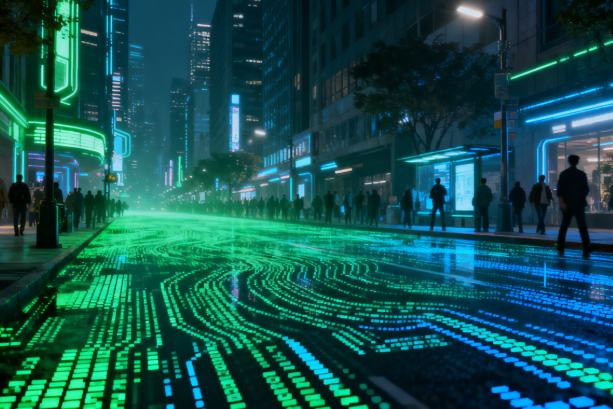Have you ever paused for a moment and wondered if everything you see, hear, and experience is real? Maybe the coffee you sipped this morning, the conversation you had with a friend, or the video you scrolled past online wasn’t “real” in the sense you think it is. What if, in a twist that sounds more science fiction than reality, your entire life is actually part of a highly sophisticated simulation? This isn’t just the plot of The Matrix or the latest episode of Rick and Morty; it’s a question that philosophers, scientists, and even tech enthusiasts are seriously exploring today.
The concept of living in a simulated reality has captured the imagination of millions, from movie buffs to tech insiders. But beneath the spectacle of Hollywood special effects and viral TikTok memes, there’s a surprisingly serious debate involving physics, computer science, and philosophy. Whether you’re a skeptic or a believer, exploring the idea of simulation theory can challenge your perception of reality and even the way you approach life itself.
The Philosophical Roots of Simulation Theory
The notion that our reality might be simulated isn’t entirely new. Philosophers have questioned the nature of reality for centuries. From Plato’s Allegory of the Cave, where prisoners perceive shadows as reality, to Descartes’ thought experiments about an evil demon manipulating our senses, humans have long wondered if what they perceive can be trusted. But it wasn’t until the early 2000s that simulation theory gained a concrete framework, largely thanks to philosopher Nick Bostrom.
Bostrom’s 2003 paper, “Are You Living in a Computer Simulation?”, proposed a provocative trilemma: at least one of the following statements is likely true:
- All civilizations at our level of technological development go extinct before they reach a “posthuman” stage capable of running detailed ancestor simulations.
- Posthuman civilizations are not interested in running simulations of their evolutionary history.
- We are almost certainly living in a computer simulation.
The logic is simple yet unsettling. If a civilization could reach a point where they could simulate consciousness and history in rich detail, and if they were motivated to do so, then the number of simulated realities could far outnumber the “real” ones. Statistically speaking, this would make it more likely that we are living in a simulation than in base reality.

Science and Technology: Could We Actually Simulate Reality?
While philosophy gives us a conceptual framework, science and technology bring the question into tangible territory. Today, the computational power available to humans is advancing at an astonishing pace. Supercomputers already simulate complex systems such as weather patterns, protein folding, and even galaxy formation. Theoretically, a civilization far more advanced than ours could simulate entire universes, complete with self-aware beings who have no idea they are living in a digital construct.
Quantum physics adds another intriguing layer. Experiments such as the double-slit experiment and quantum entanglement suggest that reality behaves in ways that are deeply counterintuitive. Some theorists have argued that certain aspects of quantum mechanics could hint at a computational substrate underlying our universe. Could particles only “decide” their state when observed because the simulation is rendering details as needed? While this is speculative, it’s a concept that fascinates physicists and computer scientists alike.
Even AI plays into the discussion. Today, AI algorithms can generate astonishingly realistic images, texts, and even entire virtual worlds. If our current level of technology can produce convincing simulations of environments and characters, imagine what could be possible in a few centuries—or millennia—by an advanced civilization. The line between “real” and “simulated” becomes blurry, raising questions about what it truly means to exist.
Simulation Theory in Popular Culture
Hollywood and gaming culture have long explored themes of reality and illusion. The Matrix, perhaps the most iconic example, imagines a world where humans are unknowingly trapped in a digital construct. Westworld pushes the idea further, blurring the line between AI consciousness and human experience. And in Ready Player One, the distinction between the virtual and the real becomes a playground for adventure, commerce, and identity exploration.
Even beyond movies, social media reflects this fascination. Memes about “waking up in the simulation” or treating life as a game have gone viral on TikTok, Reddit, and Instagram. Gamers frequently joke about “debugging reality” or achieving “real-life cheat codes,” blending humor with existential questioning. Virtual reality experiences, metaverses, and AI-generated content reinforce the feeling that reality itself might be negotiable—a trend that simulation theory seems tailor-made to explain.
The theory resonates in modern culture because it mirrors a growing unease with digital life. We increasingly live online, curated by algorithms that predict our behavior and influence our decisions. If your digital footprint can be analyzed, modeled, and even predicted, isn’t it a small step to imagine your entire life as part of a grand computational pattern?
Signs We Might Be Living in a Simulation
Whether or not simulation theory is literally true, it’s fun—and sometimes unnerving—to look for “evidence” that we are living in a simulated reality. Some of the commonly cited clues include:
- Déjà Vu Experiences: Those eerie moments when life seems to repeat itself could be glitches in the system—or just cognitive quirks of the human brain.
- Mathematical Regularities: The universe is governed by mathematical laws, constants, and equations. Some argue that a fundamentally computational universe would be inherently mathematical.
- Coincidences and Anomalies: Events that feel improbably aligned, or experiences that defy expectations, could be interpreted as subtle indicators of simulation.
- Limits of Computation: The speed of light and Planck length might represent processing limits within the simulated framework, like the “resolution” of a cosmic video game.
These are speculative and mostly philosophical, but they make for compelling thought experiments and discussion points.
The Psychological and Social Impacts
Believing—or even entertaining—the idea that we live in a simulation can affect the way people perceive their lives. On the one hand, some might find liberation: if life is a game, then constraints and failures are less intimidating. You can experiment, take risks, or redefine your purpose without fear. On the other hand, existential unease can arise. If everything is simulated, does meaning exist? Do ethics and morality matter in a world that might be artificial?
Surveys and polls reveal a surprisingly high level of curiosity about simulation theory. Tech leaders, scientists, and philosophers frequently engage in public debates about its plausibility. Even in casual settings, the theory sparks conversation, meme creation, and playful speculation. In a world dominated by screens, AI, and virtual experiences, the line between real and artificial is no longer as clear as it once was.
Interactive Thought Experiments
Engaging readers directly can make the concept of simulation theory more tangible. For instance, consider these questions:
- If you discovered you were living in a simulation, would you want to know?
- Would your behavior change if life were “programmable”?
- Could we create our own simulations, potentially housing conscious beings, and what responsibilities would we have toward them?
You could even create a simple “simulation checklist” for readers:
- Do I experience strange coincidences frequently?
- Do I notice patterns that seem too perfect or too consistent?
- Do I question the nature of reality regularly?
These thought exercises reinforce engagement and invite readers to reflect on their own experiences in a fun, interactive way.
The Future of Reality: AI, VR, and the Metaverse
Looking ahead, technology is bringing simulation theory closer to tangible reality. Virtual and augmented reality are evolving rapidly, with experiences so immersive that users can forget the “real world” exists outside the headset. AI can now create lifelike characters and environments, leading to the possibility of fully simulated societies.
The metaverse, a term once confined to science fiction, is becoming increasingly mainstream. It’s a digital layer over the physical world, blending social interactions, commerce, and entertainment into a coherent—but artificial—experience. In some sense, we are collectively building mini-simulations that mirror the very universe simulation theorists speculate we inhabit.
This convergence of philosophy, science, and technology is why the question “Are we in a simulation?” feels more pressing and relevant than ever. Even if the answer is unknowable, exploring it sheds light on human creativity, technological progress, and the way we define reality itself.

Embracing the Mystery
Ultimately, whether or not we are living in a simulation, the exploration of the question itself is enlightening. It challenges assumptions, sparks curiosity, and encourages reflection on life, purpose, and the boundaries of human knowledge. Life, simulated or not, remains a complex, fascinating, and unpredictable adventure.
Perhaps the most exciting part is not knowing. The uncertainty allows imagination to flourish, creativity to bloom, and conversations—like this one—to thrive. So the next time you sip your coffee, scroll through your feed, or gaze at the night sky, ask yourself: is this real, or is it part of something much larger? And either way, how will you leave your mark in this strange, beautiful, possibly simulated universe?



